Top 10 Best Employee Scheduling Apps
Managing employee schedules can be time-consuming and error-prone, especially in industries like retail, hospitality, healthcare, or restaurants, where shifts often change. Fortunately, employee scheduling apps streamline the process, reduce scheduling conflicts, and boost team communication. Here are 10 of the best employee scheduling apps in 2025, along with an overview of their features, pricing, pros, and cons.
For PTO and vacation tracking, consider Day Off, an easy to use app for submitting and approving leave requests, ensuring smooth team availability management.
When I Work
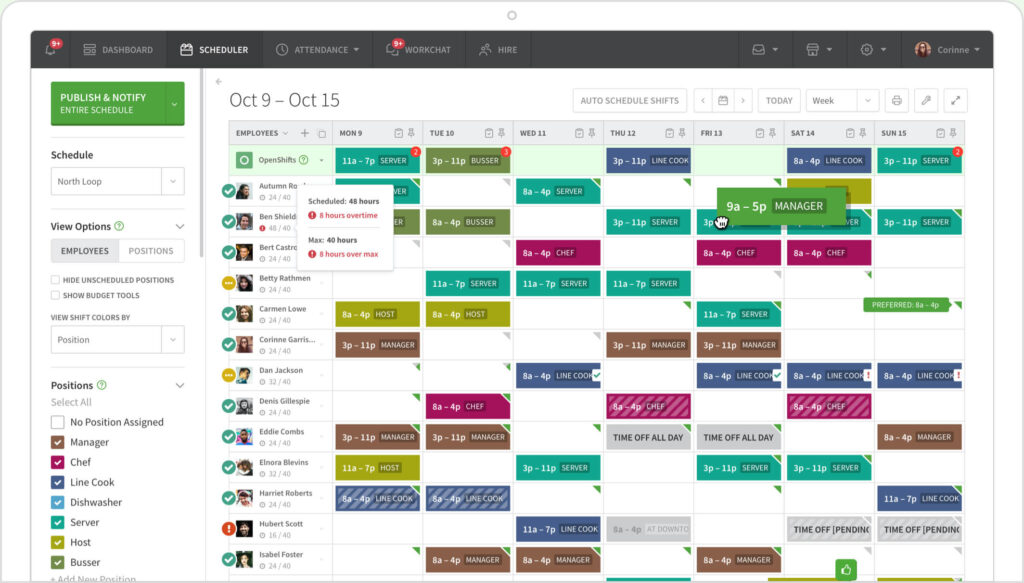
When I Work is a powerful employee scheduling tool designed to streamline workforce management and improve team communication. With its intuitive drag-and-drop scheduler, you can easily create and modify shifts, while employees can set their availability and request shift changes.
Mobile App
Messaging
Reminders
Free plan
$4 Employee / Month $8 maxmum • Trial: Yes • Free Plan: Yes.
Pros
Easy-to-use interface: The app’s layout is simple, allowing managers to create, adjust, and publish schedules quickly. Employees can also access their schedules easily through the mobile app.
Great team communication tools: Integrated messaging features make it easy to notify staff of shift changes or send group messages.
Mobile accessibility: The app is available on iOS and Android, allowing managers and employees to view schedules, manage shifts, and communicate from anywhere.
Cons
Advanced features only in higher-priced plans: Features such as labor forecasting and advanced reporting are limited to the more expensive plans, which may not be ideal for smaller businesses.
Limited reporting in basic plan: The basic pricing tier offers only minimal reporting features, making it harder to track long-term data or identify trends without upgrading.
Deputy
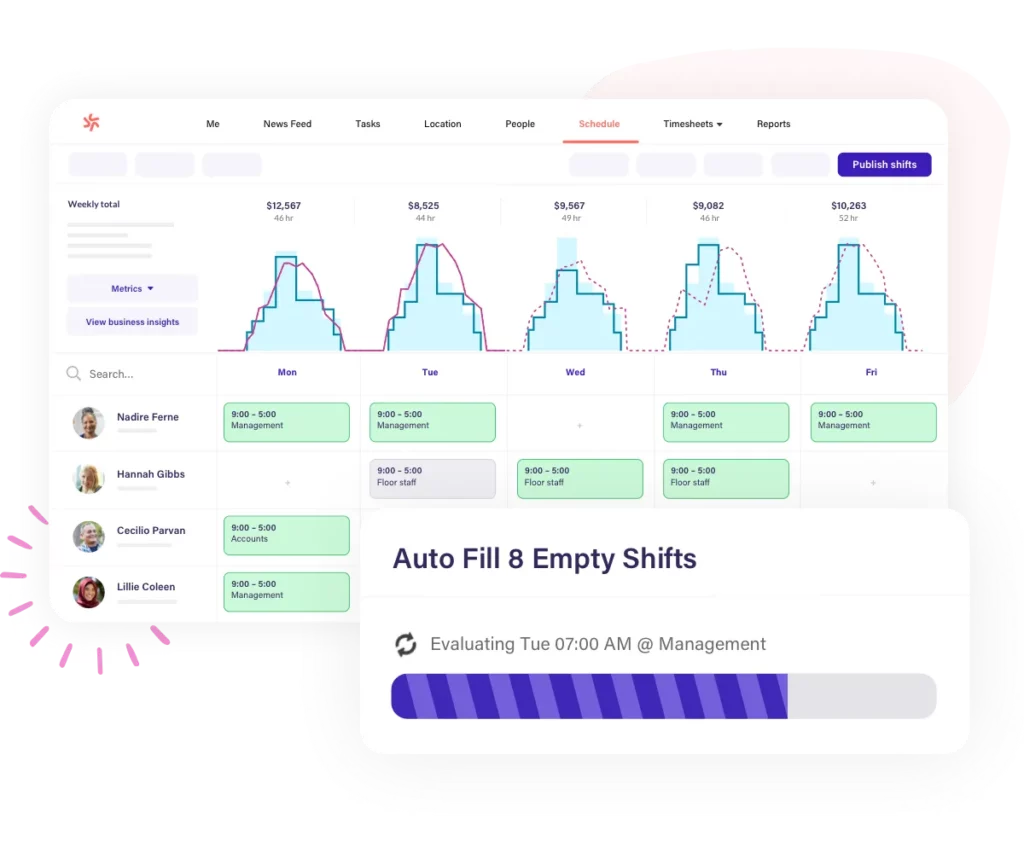
Deputy offers a comprehensive platform that includes scheduling, time tracking, and task management. Its smart AI-powered system suggests optimal scheduling based on employee availability, labor costs, and company rules, helping managers create efficient rosters.
AI-Scheduling
Compliance
Time-Tracking
$3.50 User / Month – $4.90 maximum • Trial: Yes • Free Plan: No.
Pros
AI-driven scheduling recommendations: Deputy’s AI system analyzes employee preferences, availability, and labor costs to suggest the most efficient schedules. This can save time and reduce manual effort.
Integrated time tracking: Employees can clock in and out of shifts directly through the app, making it easier to manage attendance and reduce time theft.
Compliance tools: The Deputy helps ensure businesses adhere to labor laws, including overtime regulations and break requirements, helping avoid costly legal violations.
Detailed reporting and analytics: The Deputy offers robust reports on labor costs, productivity, and attendance, helping businesses optimize their workforce and make data-driven decisions.
Cons
Additional fees for advanced features: Many of the more powerful scheduling and compliance tools come at an extra cost, potentially driving up the price for larger teams.
Steep learning curve for new users: Some users report that Deputy’s many features can be overwhelming for new employees or managers,
Homebase
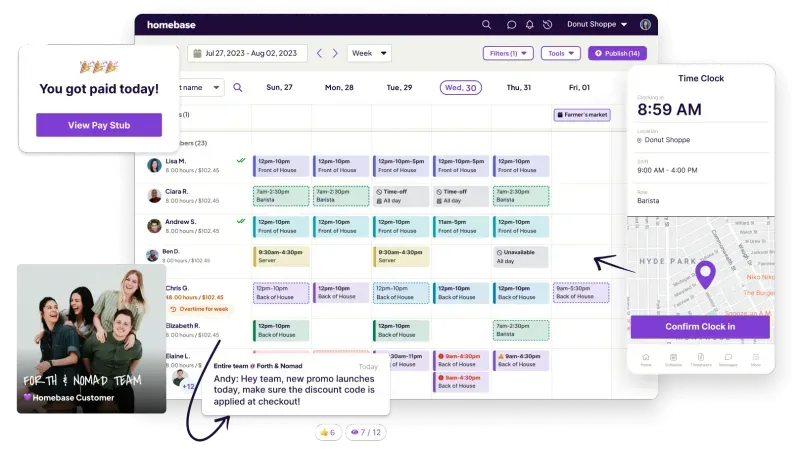
Homebase is an all-in-one employee management platform designed for small to medium-sized businesses. It offers employee scheduling, time tracking, and payroll integration, alongside basic HR features like hiring and onboarding.
Payroll
Hiring
Time-Off
$20 Location / Month • Trial: Yes • Free Plan: Yes.
Pros
Free basic plan: Homebase offers a generous free plan that includes essential scheduling and time-tracking tools, making it an ideal choice for small businesses on a budget.
Payroll and hiring integration: The app integrates with payroll systems, simplifying the process of paying employees accurately based on their logged hours. Additionally, Homebase’s hiring tools make it easier to recruit and onboard new staff.
Shift swapping and availability management: Employees can easily swap shifts, update availability, or request time off through the app, providing flexibility and reducing administrative tasks for managers.
Mobile app with team messaging: Homebase’s mobile app supports team messaging, allowing employees and managers to communicate quickly and efficiently, which helps reduce misunderstandings about schedules.
Cons
Limited advanced features in the free version: The free plan does not include advanced reporting, labor cost analysis, or compliance tracking, which can limit its utility for larger businesses or those with more complex needs.
Customer support can be slow: Some users have reported delays in customer support responses, which can be frustrating when immediate help is needed.
Shiftboard
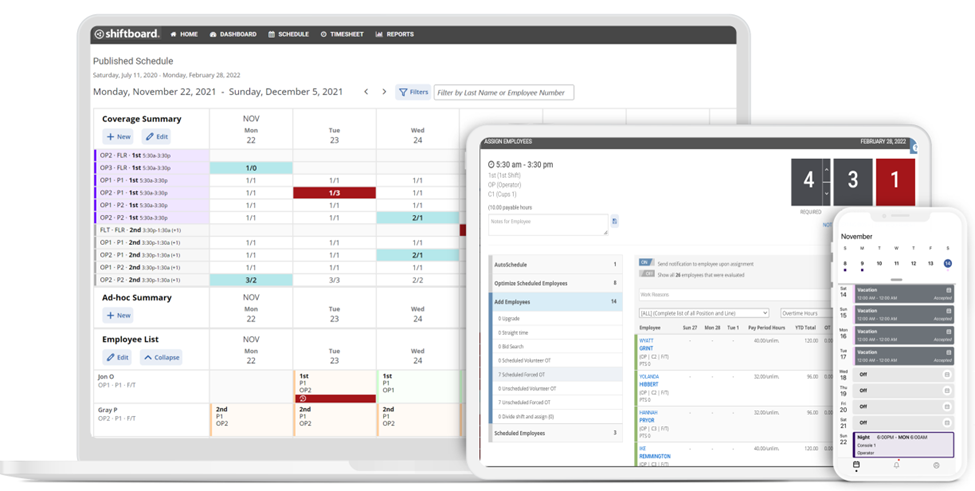
Shiftboard is designed for industries that require complex and large-scale scheduling, such as healthcare, manufacturing, and public safety. It provides advanced tools for workforce management, compliance, and real-time scheduling adjustments.
Compliance
Analytics
Customization
Custom pricing based on company size and needs; typically starts around $3-7 per user/month. Free Trial: Yes .Free Plan: No
Pros
Tailored for large, complex organizations: Shiftboard’s tools are designed to handle complicated shift patterns, large teams, and compliance needs, making it a go-to solution for industries like healthcare or public safety.
Advanced compliance and labor tracking tools: The platform offers built-in compliance checks, ensuring that businesses meet labor laws related to overtime, working hours, and break times.
Supports both hourly and salaried employees: Whether you have hourly workers or salaried staff, Shiftboard can handle both types of scheduling and track employee performance accordingly.
Excellent reporting and analytics: Shiftboard provides in-depth reports on labor trends, attendance, and compliance, giving managers the insights needed to improve efficiency.
Cons
Expensive for small businesses: Shiftboard’s pricing structure may be prohibitive for smaller companies, especially those that don’t require its advanced features.
Overwhelming for basic scheduling needs: For businesses that only need simple shift scheduling, Shiftboard’s many features might feel like overkill and add unnecessary complexity.
ZoomShift
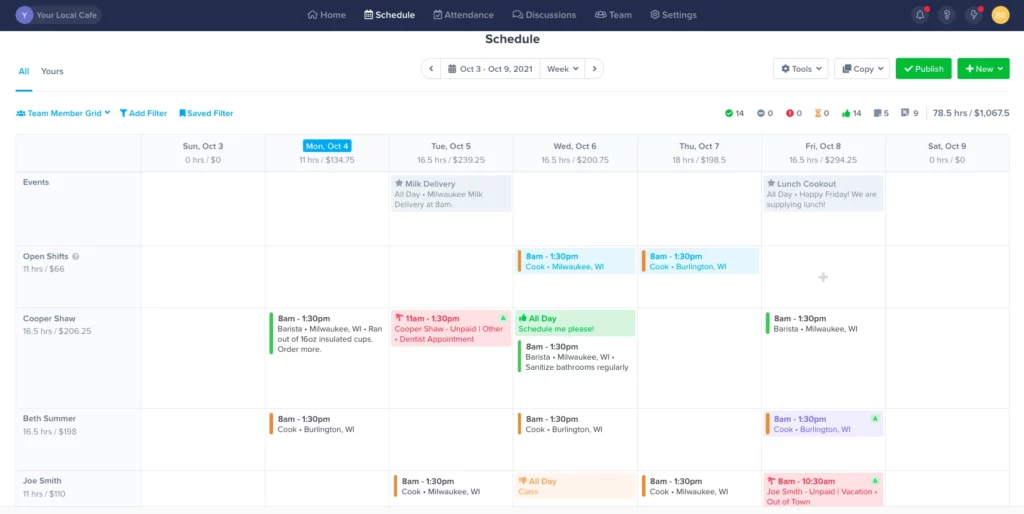
ZoomShift is a straightforward scheduling tool designed for small businesses with hourly employees. It provides an easy way to create, share, and manage schedules while giving employees the ability to clock in and out and request time off.
Clock-In
Swapping
Notifications
$2 User / Month • Trial: Yes • Free Plan: Yes.
Pros
Affordable pricing for smaller teams: ZoomShift’s low pricing makes it accessible for businesses with limited budgets, offering a solid set of scheduling tools at a reasonable cost.
Simple and intuitive interface: The app is easy to navigate for both managers and employees, reducing the learning curve and allowing teams to start using the platform right away.
Clock in/out features: Employees can use the app to clock in and out of their shifts, making time tracking seamless and reducing the need for additional hardware or software.
Time-off request and shift swap features: Employees can request time off or swap shifts with coworkers through the app, giving them more control over their schedules and reducing manual tracking for managers.
Cons
Limited features compared to larger platforms: ZoomShift lacks some of the advanced tools offered by competitors, such as labor forecasting or compliance tracking, which might be a drawback for growing businesses.
No payroll integration: Unlike some other apps, ZoomShift doesn’t integrate directly with payroll systems, which means businesses need to handle payroll separately.
Sling
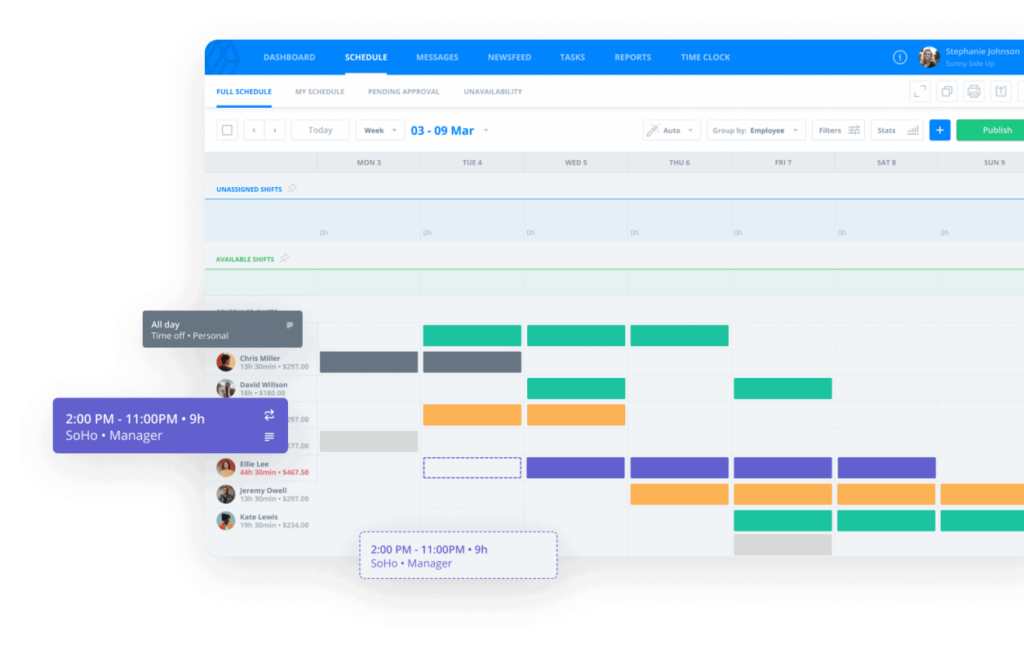
Sling combines scheduling, time tracking, and team communication into a single app. Its primary strength is the integration of messaging features, which helps reduce no-shows and makes it easier for teams to stay connected about shift changes.
Communication
Multi-Location
Integration
$1.70 User / Month • Trial: Yes • Free Plan: Yes.
Pros
Very affordable pricing: Sling offers one of the lowest pricing tiers on the market, making it an attractive choice for small to mid-sized businesses.
Combines scheduling and team communication: The integration of messaging tools directly into the scheduling app means that managers can easily notify employees of shift changes, and team members can coordinate directly with one another.
Multi-location support: Sling is ideal for businesses that operate in multiple locations, allowing managers to schedule and monitor staff across different sites from a single platform.
Strong mobile app experience: Sling’s mobile app is user-friendly and accessible on both iOS and Android, allowing employees to view schedules, message coworkers, and manage shifts on the go.
Cons
Limited payroll integrations: While Sling excels in scheduling and communication, it doesn’t offer robust integration with payroll systems, which means businesses will need additional tools for payroll management.
Premium features required for advanced functionality: Features like labor cost analysis, time tracking, and detailed reports are only available in the premium version, limiting the functionality of the free plan for growing businesses.
7shifts
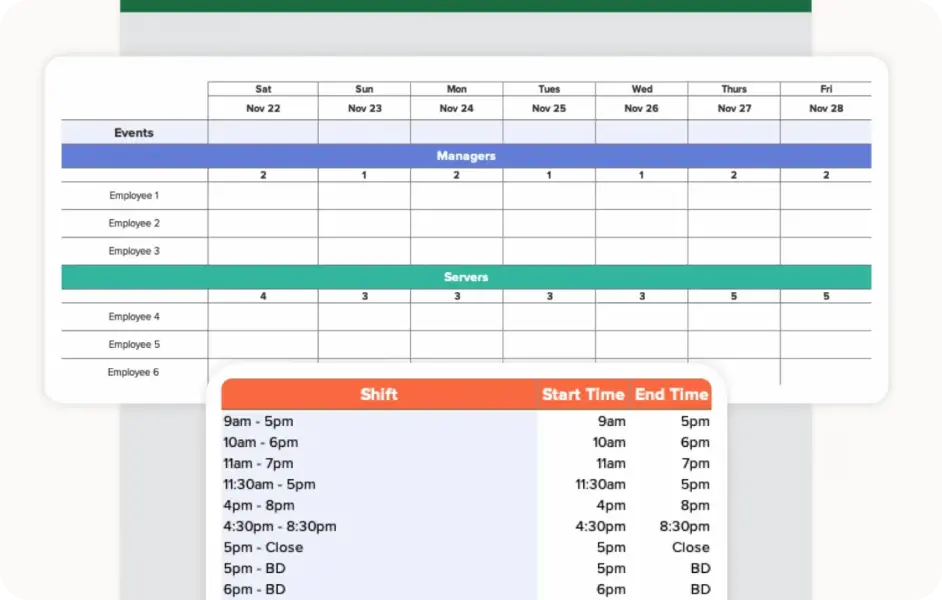
7shifts is a scheduling app tailored specifically for the restaurant industry. It offers tools for managing shifts, tracking labor costs, and monitoring employee performance, and integrates with many popular restaurant POS systems like Toast and Square.
POS-Integration
Performance
Reminders
$29.99 Location / Month • Trial: Yes • Free Plan: Yes.
Pros
Optimized for restaurants: 7shifts is designed with the restaurant industry in mind, offering features that help managers efficiently handle the complexities of shift work, labor compliance, and employee performance.
Labor cost tracking: The app tracks labor costs in real-time, giving managers insights into how labor expenses align with sales, allowing them to make data-driven staffing decisions.
POS system integration: 7shifts integrates with restaurant POS systems, which simplifies scheduling based on sales forecasts and makes it easy to track labor costs about revenue.
Shift reminders and time-off management: Employees receive automatic shift reminders, and the app supports time-off requests and shift swaps, giving employees flexibility while reducing administrative burdens on managers.
Cons
Tailored primarily for restaurants: While 7shifts excels in the restaurant industry, it may not be as versatile or effective for businesses in other sectors.
Free plan limited to one location: The free plan only supports one location, making it less useful for businesses with multiple sites unless they opt for a paid plan.
ShiftNote
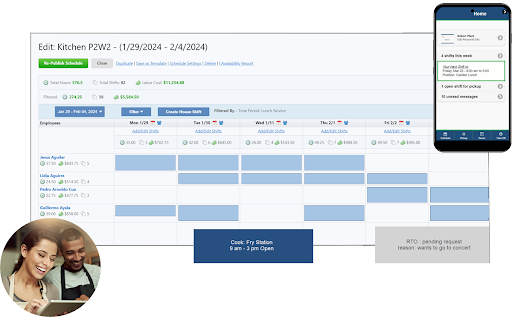
ShiftNote is a straightforward scheduling tool that’s well-suited for hospitality, retail, and restaurant industries. It allows managers to create and edit shifts, track attendance, and manage employee availability.
Attendance
Swapping
Availability
$35 Location / Month • Trial: Yes • Free Plan: No.
Pros
Ideal for multi-location businesses: ShiftNote’s scheduling tools work well for businesses with multiple locations, offering the ability to manage schedules across different sites from one platform.
Easy shift swapping and time-off requests: Employees can easily swap shifts or request time off, reducing administrative work for managers and improving flexibility for workers.
Attendance tracking: The app allows businesses to track employee attendance, which is essential for performance monitoring and payroll accuracy.
Historical data analysis: ShiftNote provides access to past schedules, helping managers spot trends and create more efficient future schedules.
Cons
No free plan: Unlike some competitors, ShiftNote does not offer a free version, which could be a barrier for small businesses with tight budgets.
Can get expensive for large teams: At $35 per month per location, costs can add up quickly if your business operates multiple locations or has a large number of employees.
Planday
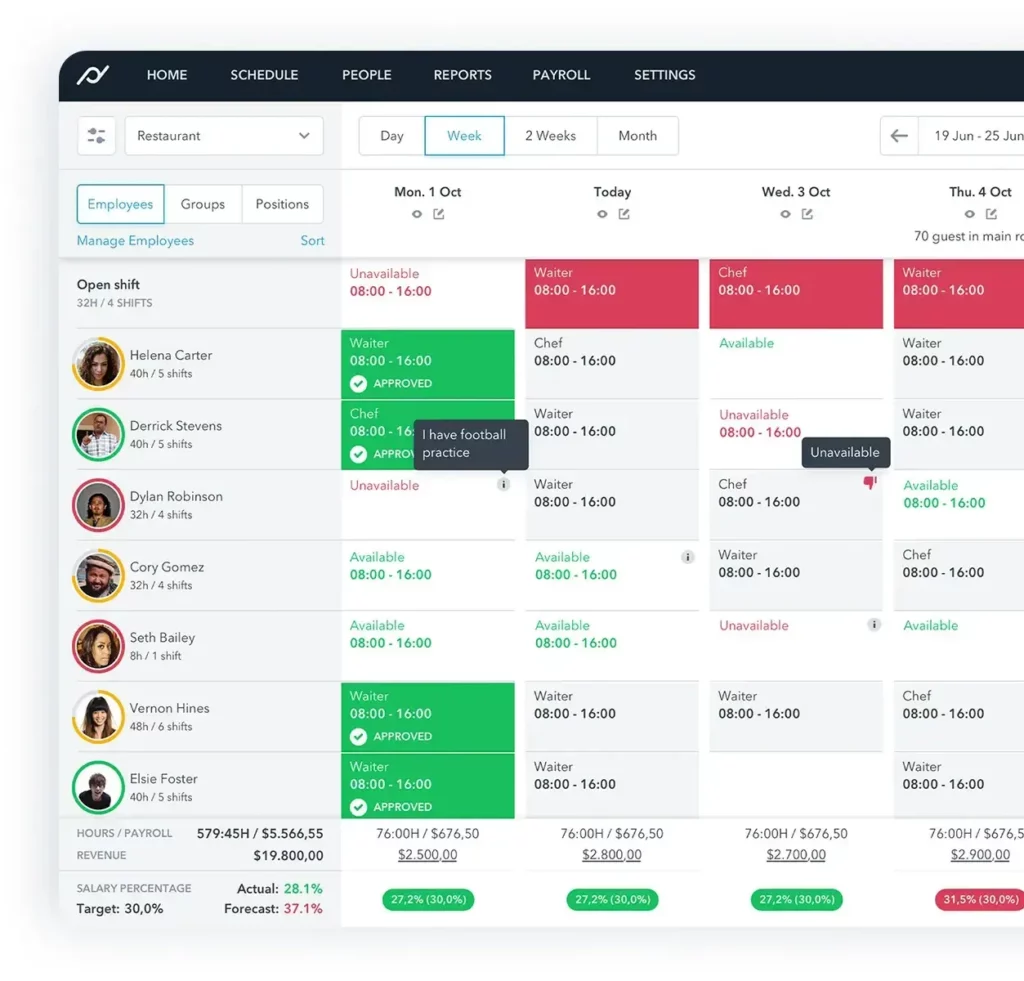
Planday is built for shift-based businesses and offers scheduling, time tracking, payroll integration, and communication tools. It’s a robust solution for medium to large teams with multiple locations.
Payroll
Templates
Multi-Location
$2.49 User / Month • Trial: Yes • Free Plan: No.
Pros
Payroll and HR system integration: Planday integrates with many payroll and HR platforms, ensuring seamless synchronization of employee hours and wages.
Customizable scheduling templates: Managers can create templates based on past schedules, saving time and ensuring consistency in shift allocation.
Multi-location support: Planday is ideal for businesses with multiple locations, allowing managers to oversee scheduling across various sites from a single dashboard.
Mobile app for managers and employees: The mobile app makes it easy for employees to check their schedules, request time off, and communicate with managers. Managers can make scheduling adjustments on the go.
Cons
Cost can rise with team size: While affordable for smaller teams, Planday’s per-user pricing can become costly for larger businesses with hundreds of employees.
Steep learning curve for some features: Some users report that Planday’s advanced features, such as labor forecasting and payroll integration, can be complex and require training to use effectively.
Humanity

Humanity is an advanced employee scheduling platform focused on optimizing workforce management for large enterprises. It offers drag-and-drop scheduling, time tracking, and predictive labor tools to help businesses operate more efficiently.
Forecasting
Budgeting
Compliance
$3 User / Month – $216 maximum • Trial: Yes • Free Plan: Yes.
Pros
Labor forecasting and budgeting: Humanity’s tools for forecasting labor demand and tracking budgets allow managers to create schedules that balance employee availability with business needs, helping control labor costs.
Customizable scheduling templates: The app allows managers to create reusable templates for shifts, saving time and ensuring consistency across scheduling periods.
Payroll and HR integration: Humanity integrates with many payroll and HR platforms, ensuring accurate tracking of employee hours and seamless payroll processing.
Compliance tracking: Humanity helps businesses stay compliant with labor laws, tracking overtime and break requirements to ensure legal obligations are met.
Cons
Best suited for larger businesses: Humanity’s advanced features are designed for larger enterprises, making it less suitable for small businesses that don’t need complex workforce management tools.
Complex for new users: Some users report that the wide range of features can be overwhelming for first-time users, requiring significant training to get the most out of the platform.